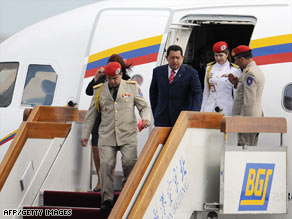It had the atmosphere of the Cold War.
Venezuelan president Hugo Chavez's trip to Russia this month brought back memories of the 40-year East-West confrontation when Fidel Castro was the Soviet Union's favorite Latin American dictator. The warm greeting, the fact it was Chavez's sixth visit to Russia and his use of the familiar Russian 'you' (ty) when talking to Vladimir Putin indicated the closeness of the relationship that was once Castro's.
Even the rhetoric was the same. Like El Presidente, Chavez insisted on a "strategic alliance" to meet "the threat of the United States" and requested the Russians establish a base on Venezuelan territory. The only thing missing was a mention of Cuba's dismal fate, which Chavez seems bent on imitating.
The anti-American Venezuelan leader, who once described himself as "very Maoist all of my life", is always welcome in Moscow. In the past, the outspoken dictator has left behind billions of dollars in orders for the latest Russian weaponry, making his country Russia's third best customer for armaments after China and India. And Chavez did not disappoint his hosts this time either.
On his shopping list this visit were tanks, coastal surveillance aircraft, air defence systems and non-atomic submarines, all of which represent another instalment of the five to six billion dollars oil-rich Venezuela eventually plans to spend on Russian arms. This latest purchase, combined with the previous ones, have made the South American country Russia's biggest arms customer in Latin America.
Already between 2005 and 2007, Venezuelan oil revenues bought an estimated two billion dollars in Russian weapons. Among these items was a controversial purchase of 100,000 Kalashnikov assault rifles. Although Chavez claimed they were for home defence use, some of them, it is believed, were smuggled to leftist South American terrorist organizations in neighboring countries, such as FARC in Colombia.
Chavez has said the Russian weapons he has purchased will protect his country from an American invasion, a claim that Washington calls ludicrous. Venezuela's president believes the United States may one day try to capture his country's oil reserves. Venezuela is currently the world's fifth-largest exporter of oil and provides America with about 15 per cent of its crude imports.
The real reason behind Chavez's Russian arms purchases, however, is not self-defence. On the contrary, one analyst states they are meant to back up his ongoing quest to expand his influence in South America. Chavez's end goal is the creation of an anti-American bloc with himself as leader, which would also satisfy his reported inclination to megalomania. In carrying out his plan, he is emulating his hero, Castro, who long tried to export communist revolution throughout the region.
For its part, the Kremlin's main emphasis during Chavez's trip was not on the arms sales but rather the signing of energy exploration agreements. In this the Russian leadership achieved its goal. Russian oil and gas companies had already been exploring in Venezuela; but the agreements Chavez signed during his recent visit have given the giants in the Russian energy field an expanded role.
"We can say that Russia and Venezuela have achieved a strategic alliance in the energy sphere," he said.
Russia regards its support for Chavez as a countermove to the much disliked missile defence system the United States intends to set up in Czechoslovakia and Poland. The Chavez gambit is also seen as a response to American bases established in Central Asian countries that were once Soviet republics. The Kremlin still regards these states as being within its sphere of influence.
Moscow was also unhappy with the thousand American troops sent this month to Georgia, a country on its southern border, to conduct joint military exercises with Georgian forces. The Russian army immediately staged a counter exercise close by. And only last week Moscow announced as another countermeasure its intention to have long-range bombers refuel in Cuba, six years after it had closed its last base there.
But Russia's and Venezuela's attraction for one another may also concern the political nature of these states. Analyst and author Robert Kagan has written that the world's new political alignment will see democracies line up against autocracies, citing as an example the Shanghai Cooperation Organization, which consists of autocracies led by Russia and China. These two world powers, Kagan adds, will always offer fellow autocrats, like Chavez and Zimbabwe's Mugabe, refuge and assistance.
But with this Russian "assistance" in the form of weapons, Chavez has only succeeded in fuelling a regional arms race. Chile is now spending colossal sums on arms, as are Brazil and Colombia. London's International Institute For Strategic Studies stated defence expenditures in Latin America in 2003 were 25 billion dollars, while last year they reached 38 billion. Such high outlays for weapons will probably see Venezuela's economy eventually suffer the same bleak fate of Cuba's and the Soviet Union's, which also emphasized armaments and expensive foreign adventures to the detriment of internal development.
Such large arms purchases by South American countries also represent an obvious potential for regional destabilization, especially combined with Chavez's dangerous unpredictability. These factors probably played a role in the decision to reactivate the U.S. Fourth Fleet last April after nearly 60 years. The fleet's home port will be in Florida and it will patrol Caribbean and South American waters.
Predictably, it was the three leftist, anti-American regimes in South America, Venezuela, Bolivia, and Cuba, who were most vociferous in protesting the fleet's return. Castro, who knows about American naval blockades, even wrote an article against it in a Cuban newspaper. Chavez simply called it "an act of war."
But one Latin American newspaper reported that Mexican drug cartel criminals are being sent to Iran via Venezuela for advanced training in building car bombs. If one such terrorist vehicle should ever be detonated, with Venezuelan assistance, in the United States, then Chavez would suffer a worse fate than Castro ever did. The Fourth Fleet would see to that.




 Reply With Quote
Reply With Quote










Bookmarks